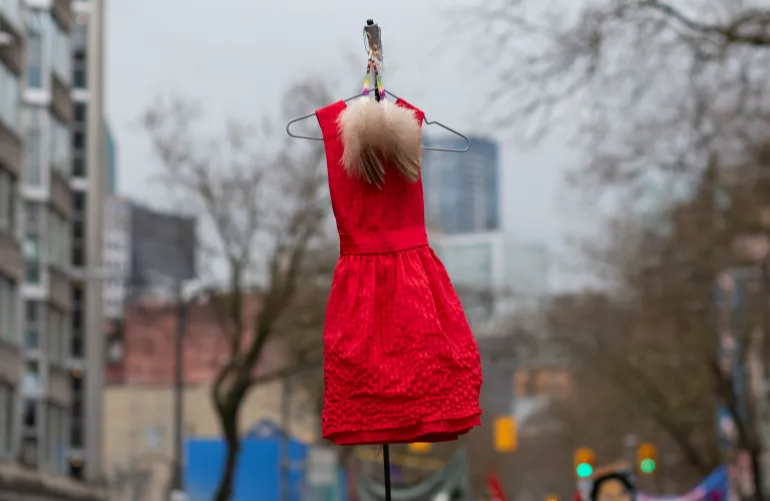
Advocates demand urgent action on day commemorating missing and murdered Indigenous women and girls in US and Canada.
A red dress to symbolise missing and murdered Indigenous women and girls is seen during a march in Vancouver, Canada, last year [File: Amy Romer/Reuters]
Ottawa, May 5 (RHC)-- Calls are once again ringing out in Canada and the United States for action to stop violence against Indigenous women and girls, a persistent problem that has devastated communities across North America for decades.
Friday marks Missing or Murdered Indigenous Persons Awareness Day in the United States, while it is the National Day of Awareness for Missing and Murdered Indigenous Women and Girls (MMIWG), otherwise known as Red Dress Day, in Canada.
“On Missing or Murdered Indigenous Persons Awareness Day, we remember the many lives shattered or lost, and commit to working with Native communities to find justice, keep families safe, and help them heal,” US President Joe Biden said in a statement. “Indian Country has been gripped by an epidemic of missing or murdered Indigenous people, whose cases far too often go unsolved,” he said, describing the issue as a “crisis.” “We need to respond with urgency and the resources needed to stop the violence and reverse the legacy of inequity and neglect that often drives it.”
Indigenous people have sounded the alarm for years about the disproportionately high number of women, girls and two-spirit people who have been killed or disappeared in the U.S. and Canada. Two-spirit is a term used by some Indigenous people to describe their gender and spiritual identity. Advocates also have denounced systemic inaction on the part of government and law enforcement agencies to address the issue.
In Canada, the federal police force reported in 2014 that nearly 1,200 Indigenous women had been murdered or gone missing in Canada between 1980 and 2012 – but community members have said the real number was likely much higher.
A National Inquiry on Missing and Murdered Indigenous Women and Girls concluded in 2019 that the violence “amounts to a race-based genocide of Indigenous Peoples” that especially targets women, girls and members of the LGBTQ2S+ community.
On Friday, a group of Canadian ministers expressed support for all those affected by the violence. “We are committed to working in partnership with Indigenous families, survivors, leaders, and partners, as well as with provinces and territories, to make transformational change that will end this national crisis,” they said in a joint statement.
But in the lead-up to the day of commemoration, Indigenous leaders said Canada had not done enough to address the decades-long crisis.
Canadian legislators unanimously passed a motion in the House of Commons on Tuesday urging Prime Minister Justin Trudeau’s government to declare a national emergency. The motion also called on Ottawa to set up a “Red Dress Alert” system to notify the public when an Indigenous woman, girl or two-spirit person goes missing.
“This is a crisis. People are going murdered and missing every day,” Canadian parliament member Leah Gazan, who spearheaded the motion, said during a news conference on Tuesday. “We are precious, we are valuable, we are loved and we are not garbage,” Gazan said.
Hilda Anderson-Pyrz, member of the Nisichawayasihk Cree Nation and chair of the National Family and Survivors Circle, added that “every day is a fight for survival” for Indigenous women, girls and two-spirit people in Canada. “We are exhausted from fighting systemic and structural racism that is killing us,” Anderson-Pyrz said during the news conference. “Canada has a responsibility to support immediate, sustained and impactful action.
In 2019, Prime Minister Trudeau stated that the government accepts that the murders and disappearances of Indigenous women and girls across Canada in recent decades amount to an act of genocide. “It is now four years later and the crisis continues, not to be met with the urgency, commitment and the prioritization required.”

